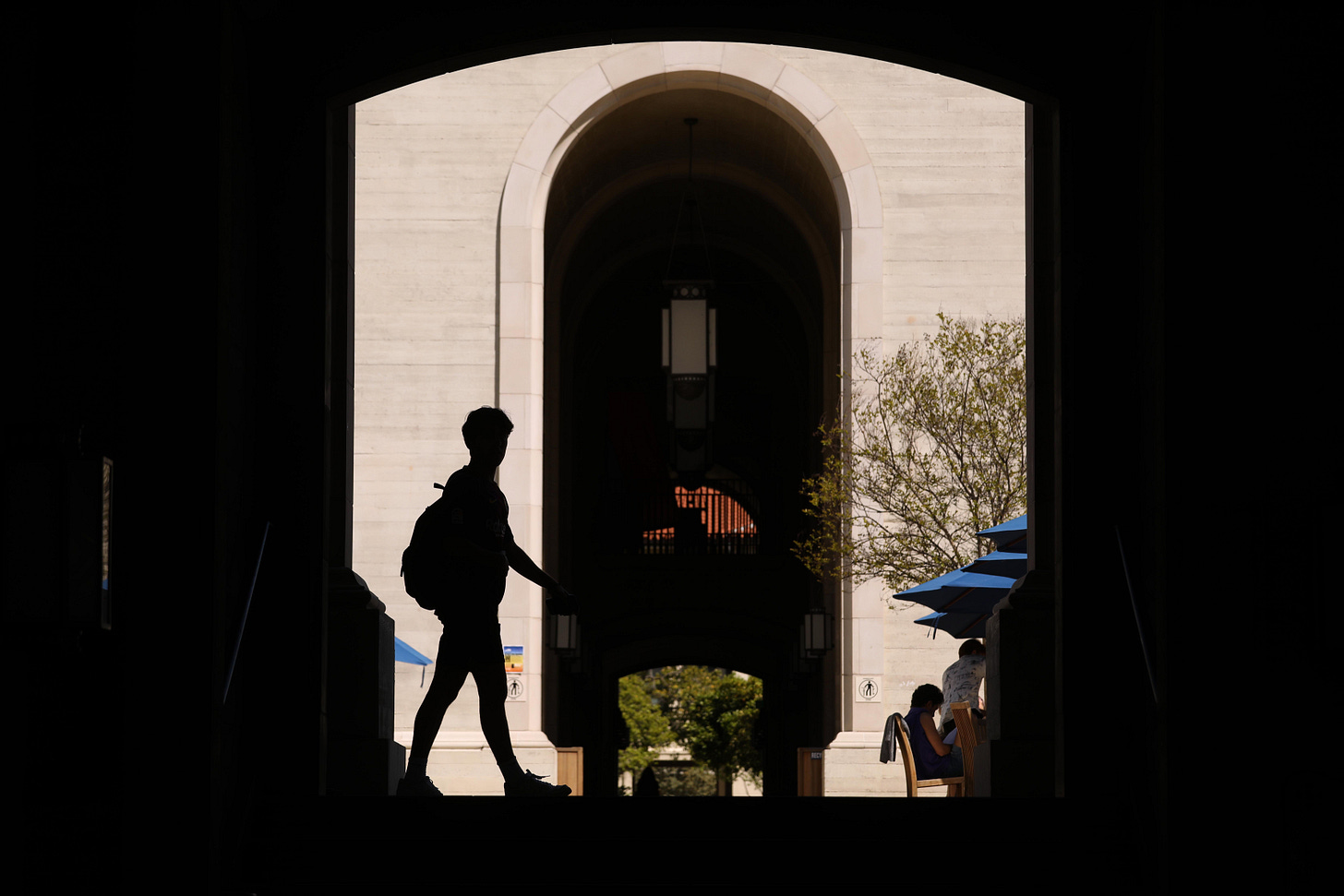Professors Need to Diversify What They Teach
It isn't indoctrination. But it is a lack of ideological diversity.
The right seems to be on a mission to expose universities as centers of leftist indoctrination. Too often we professors waved away the charge. We called these assertions naive at best, Trumpy at worst. Students, we rightly noted, are not putty in our hands, to be molded as we see fit. They have their own minds. Plus, we all too often struggle to even get them to do the readings. How could we possibly be indoctrinating them?
This objection has been made plenty of times. But it’s time we saw it for what it is: A dodge that deflects attention away from what professors are actually doing in their classrooms. The truth is that far too many are teaching in ways that look a lot like they’re trying to indoctrinate students, even if that isn’t always their intention.
We just completed a study that draws on a database of millions of college syllabi to explore how professors teach three of the nation’s most contentious topics—racial bias in the criminal justice system, the Israel-Palestine conflict, and the ethics of abortion. Since all these issues sharply divide scholars, we wanted to know whether students were expected to read a wide or narrow range of perspectives on them. We wondered how well professors are introducing students to the moral and political controversies that divide intellectuals and roil our democracy.
Not well, as it turns out. Across each issue we found that the academic norm is to shield students from some of our most important disagreements.
Consider, for example, Michelle Alexander’s important 2010 book, The New Jim Crow. Alexander argued that mass incarceration emerged after the collapse of the Jim Crow system in the South, largely as a way to reestablish the subjugation of black Americans. It would be hard to overstate its influence. Ibram X. Kendi called it “the spark that would eventually light the fire of Black Lives Matter.” And on college campuses, it became the assigned reading. On the topic of race and the criminal justice system, no other work is more popular in the syllabi database; it appears in more than four thousand syllabi in U.S. universities and colleges.
As soon as it was published, The New Jim Crow stirred contention within academia. The most prominent critic was James Forman, Jr., a professor at Yale Law School. In a seminal working paper, Forman challenged Alexander’s thesis. Among other shortcomings, Forman wrote that The New Jim Crow “fails to consider black attitudes toward crime and punishment, ignores violent crimes while focusing almost exclusively on drug crimes, obscures class distinctions within the African American community, and overlooks the effects of mass incarceration on other racial groups.” Forman’s work culminated in a book titled Locking Up Our Own, a well-regarded work that won the Pulitzer Prize.
How often is Forman’s book assigned along with Alexander’s? Less than four percent of the time. Other prominent critics—like Michael Fortner, John Pfaff, and Patrick Sharkey—are assigned even less often. Fortner’s important book The Black Silent Majority, for example, is assigned with The New Jim Crow less than two percent of the time.
So what is assigned with The New Jim Crow? Mostly books that are broadly aligned with it. The three most commonly co-assigned texts include Angela Davis’s Are Prisons Obsolete?, Ta-Nehisi Coates’s Between the World and Me, and Michel Foucault’s Discipline and Punish. We estimate that less than 10 percent of professors assigning Alexander’s book actually teach the controversy surrounding it.
Teaching of Israel and Palestine fits the same pattern. Staunchly anti-Zionist texts—those that question the moral legitimacy of the Israeli state—are commonly assigned. Rashid Khalidi, the just-retired Edward Said Professor of Modern Arab Studies at Columbia, is the most popular author on this topic in the database. A Palestinian-American and member of the Palestine Liberation Organization delegation in the 1990s, Khalidi places the blame on Israel for failing to resolve the conflict and sees the country’s existence as a consequence of settler-colonialism.
The problem is not the teaching of Khalidi itself, as some on the American right might insist. To the contrary, it is important for students to encounter voices like Khalidi’s. The problem is who he is usually taught with. Generally, Khalidi is taught with other critics of Israel, such as Charles D. Smith, Ilan Pappe, and James Gelvin.
Not only is Khalidi’s work rarely assigned alongside prominent critics; those critics seem to hardly get taught at all. They include Israel: A Concise History by Daniel Gordis, a professor at Shalem College in Israel. Despite winning the National Jewish Book Award, Gordis’s book appears only 22 times in the syllabus database. Another example is the work of Efraim Karsh, a prominent historian. His widely-cited classic, Fabricating Israeli History, appears just 24 times.
For most students, though, any exposure to the conflict begins and ends with Edward Said’s Orientalism, first published in 1978. Said is the intellectual godfather of so many of today’s scholars of the Middle East, thanks in no small part to this classic book. In Orientalism, Said claimed to be the first scholar to “culturally and politically” identify “wholeheartedly with the Arabs,” and he faulted the West for not recognizing the “Zionist invasion and colonization of Palestine.”
Orientalism is among the most popular books assigned in the United States, showing up in nearly four thousand courses in the syllabus database. But although it was a major source of controversy, both then and now, it is rarely assigned with any of the critics he sparred with, like Bernard Lewis, Ian Buruma, or Samuel Huntington. Instead, it’s most often taught with books by fellow luminaries of the postmodern left, such as Frantz Fanon, Judith Butler, and Michel Foucault.
What about the ethics of abortion? This question is taught in a more even-handed way, at least compared to the other issues we studied. More than a third of syllabi that assign Judith Jarvis Thomson’s classic defense of abortion rights, for example, pair it with a pro-life voice. Yet even in this case, we observe the same pattern: Most professors shield their students from scholarly controversy.
These patterns are likely the result of several causes. Some professors may simply be unaware of the broader scholarly controversies surrounding these issues, especially if they are teaching material well outside of their field. Roughly a quarter of professors who teach The New Jim Crow, for example, are trained in the fields of English, social work, education, theology, and philosophy—and thus they presumably have no real expertise in law or political science. So, not surprisingly, we find that they are even less likely to assign Alexander’s critics than political scientists or historians. (By way of contrast, the ethics of abortion is almost entirely taught by philosophers—that is, by scholars with real expertise in the subject matter. It’s not surprising that their courses better reflect their field’s disagreements.)
We also suspect that too many professors, swept up in this or that moral cause, use the classroom as an opportunity to press that cause onto their students. The temptation to do so must be especially strong when they are convinced of their own particular analysis. The logic goes something like this: If, in our considered judgement, scholars like Alexander, Khaldi, and Thomson see further than others, then isn’t it our duty to privilege these thinkers? Do we really have any special obligation to teach their misguided critics?
The biggest problem with this line of reasoning was identified by John Stuart Mill long ago. Put bluntly, it’s arrogance and, worse, paternalism, based on an assumption of infallibility. There is no good reason to suppose that any of these thinkers have a monopoly on wisdom, or the right to decide these matters for students, when there is a real debate among the experts. And even if these thinkers did have such a monopoly, it would still be valuable to teach their critics, so students can become more fluent in the ideas that divide both intellectuals and the public, and sharpen the analytic skills that they will need to make the world better.
Having taught controversial topics ourselves, we also believe that syllabi always create an Overton window—a range of reasonable points of view. The problem with the way most syllabi narrow Overton windows is that they tend to keep discussion within ideologically “safe” boundaries. Inculcating such habits of thought can’t be good for students, even if we believe that this or that perspective is far nearer to the truth than those we are excluding. It also creates a false impression of intellectual consensus where there is none.
Perhaps the most troubling objection to our project, and the most emphatic complaint we’ve heard since posting our paper, is that now is not the time to be raising these concerns. In the face of Trump’s blunderbuss war on the universities, we shouldn’t air our profession’s dirty laundry. One colleague, whose work we deeply respect, told us that it could be used “as a pretext” to do even more damage to the institutions that we love.
But we are convinced that there are other dangers to ignoring a real problem—dangers that are every bit as existential as Trump’s war on the universities. If we professors suspend our critical inquiries in the face of this emergency, then Trump has truly destroyed higher education.
So here is our suggestion: Professors should actually teach the scholarly controversies on the issues that most divide them, and they should advertise their success at opening their classrooms to dissenting perspectives. These changes could be incentivized through generous course development grants. Institutions could offer more teaching workshops to graduate students and new professors, many of whom have little guidance on how to teach.
This is not an attempt to de-politicize universities, nor an appeal to “neutrality.” The irony is that we can only temper the current political war over higher education by politicizing our courses; that is, by building more contention into them. It may take decades to fully right our ship. But if we succeed, future generations of professors will be able to do more than dodge the question, “Aren’t you professors just indoctrinating students?” Unlike us, they will be able to answer future critics of academia with an unequivocal “no”—and for proof, point to thousands of balanced syllabi on the issues that most divide us.
Jon A. Shields, Yuval Avnur, and Stephanie Muravchik are professors at the Claremont Colleges.
Follow Persuasion on Twitter, LinkedIn, and YouTube to keep up with our latest articles, podcasts, and events, as well as updates from excellent writers across our network.
And, to receive pieces like this in your inbox and support our work, subscribe below:










A colleague once said to me that "we teach criticisms of the canon, but not the canon", leaving our students without a clear grasp of either the "canon" or why the critiques are important and meaningful (or not). That stuck with me and helped me change my teaching approach.
Thank you for this excellent article, which makes some great points! "Roughly a quarter of professors who teach The New Jim Crow, for example, are trained in the fields of English, social work, education, theology, and philosophy—and thus they presumably have no real expertise in law or political science." Indeed, the fact that most controversial topics are taught in American universities in English departments has created enormous damage to generations of students. In my own field, French studies, English professors taught for years so-called "French theory" (an American concept based on a misappropriation of French philosophers)--people who not only cannot read the original, but have no knowledge of the general cultural context and misinterpret what they read. This is how many American students have come to believe that by saying that "one becomes a woman, one is not born a woman", De Beauvoir meant that biology doesn't matter (a gross misinterpretation based on decontextualization).